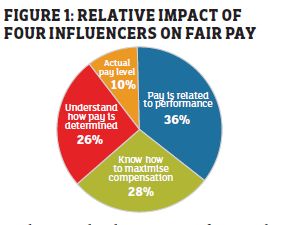How much does pay really matter to us in our jobs? People go to work for two broad reasons. Firstly, they do it to provide for themselves and their families, not only to put food on the table and a roof over their heads but also to educate their children and have experiences like travel and leisure. The second reason is that work has become the way we define ourselves, how we contribute to the communities in which we live, and how we impact the world around us. So how does the pay cheque factor into this?
A recent study by Dr Jack Wiley from the High Performance Institute, by Kenexa, an
IBM company, gave some of the best answers I have seen to date. Over many years of research, Dr Wiley found that employees want three things from their organisational leaders: to be Inspired (32%), Respected (31%), and Rewarded (37%). Under each of these macro categories sit three specific subfactors. The three under Rewarded are: Appropriate and fair compensation (21%), Career growth (10%), and Job security (6%).
Perhaps not surprisingly, getting paid fairly for the work you do is very important, and is in fact the largest factor of all nine subfactors. However, what is it about pay that is so important? The epiphany is that the actual pay level only accounts for 10% of our opinion of pay fairness! What’s really important to our perception of fair pay is how it is related to performance (36%), that we know how to maximise it (28%), and we understand how it is determined (26%). See Figure 1.
This is fantastic news for all managers and leaders. It’s common to see a deflated and defeated manager mumble, “I can’t help it if my team feels underpaid”. This evidence now puts a solution in all of their hands: be more open and transparent about pay practices. The benefits are exponential as employees feel more appreciated and engaged, without any actual pay rise.
Start communicating candidly to your team about your pay practices:
1. Explain how performance is measured, what great performance looks like and how it is rewarded. This not only relates pay to performance but also sets out the triggers to maximise reward. If this conversation still can’t be had because performance is not measured, or because reward is not differentiated based on performance, then there is a separate issue altogether.
2. Discuss how pay is determined. Without information on how pay packages are created, employees will make their own conclusions. Additional information from the compensation team might be needed, but as managers we should seek that out and openly discuss it with our teams.
3. Share the compensation philosophy. This is organisationally determined so may not be within the remit of the manager to change, but sharing it gives employees even more information to calibrate their perceptions. For example, the philosophy might be to pay at the 50th percentile of market pay but differentiate on variable compensation by paying at the 75th percentile.
So, pay is extremely important. Our pay cheque allows us to provide for ourselves and our families. It helps us feel that our contributions matter. Although fair pay is the biggest ask we have of our organisational leaders, the actual amount has the smallest impact on our perceptions of fairness. Knowing how our pay is determined, how it relates to performance, and how it can be maximised increases the perception that our pay is fair for the work we do, and this is incredibly motivating and fulfilling.
Andrew Brock, client services director, Kenexa, an IBM Company, 60 City Road, Southgate, Melbourne, Phone 132 426 or email [email protected]


